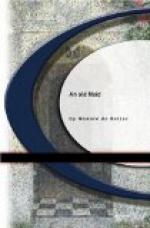Besides his fiction of an annuity, about which no one at the present time knew anything, the chevalier really had, therefore, a bona fide income of a thousand francs. But in spite of this bettering of his circumstances, he made no change in his life, manners, or appearance, except that the red ribbon made a fine effect on his maroon-colored coat, and completed, so to speak, the physiognomy of a gentleman. After 1802, the chevalier sealed his letters with a very old seal, ill-engraved to be sure, by which the Casterans, the d’Esgrignons, the Troisvilles were enabled to see that he bore: Party of France, two cottises gemelled gules, and gules, five mascles or, placed end to end; on a chief sable, a cross argent. For crest, a knight’s helmet. For motto: “Valeo.” Bearing such noble arms, the so-called bastard of the Valois had the right to get into all the royal carriages of the world.
Many persons envied the quiet existence of this old bachelor, spent on whist, boston, backgammon, reversi, and piquet, all well played, on dinners well digested, snuff gracefully inhaled, and tranquil walks about the town. Nearly all Alencon believed this life to be exempt from ambitions and serious interests; but no man has a life as simple as envious neighbors attribute to him. You will find in the most out-of-the way villages human mollusks, creatures apparently dead, who have passions for lepidoptera or for conchology, let us say,—beings who will give themselves infinite pains about moths, butterflies, or the concha Veneris. Not only did the chevalier have his own particular shells, but he cherished an ambitious desire which he pursued with a craft so profound as to be worthy of Sixtus the Fifth: he wanted to marry a certain rich old maid, with the intention, no doubt, of making her a stepping-stone by which to reach the more elevated regions of the court. There, then, lay the secret of his royal bearing and of his residence in Alencon.




